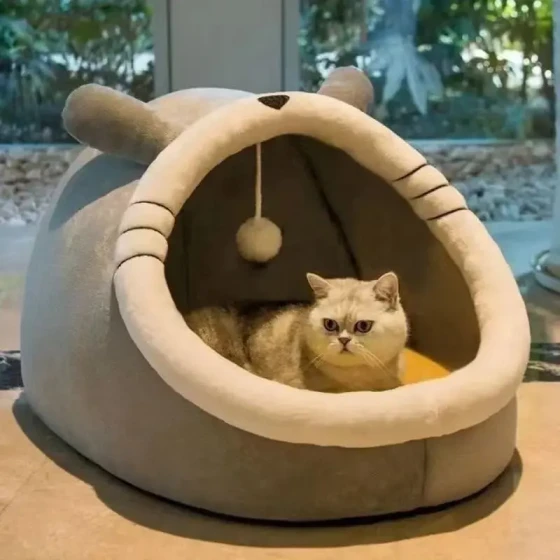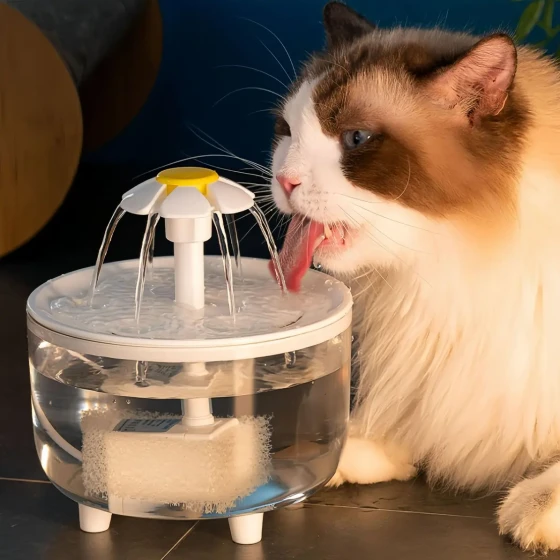What to Do When a Trained Cat Urinates Everywhere Again?

During cat ownership, various setbacks are inevitable. For example, a cat that has gone through long and arduous litter training might suddenly urinate everywhere at home again. Facing the wet spots and the strong smell of urine throughout the house, the owner's feelings must be mixed. Of course, there are many reasons why cats urinate everywhere; some may be due to illnesses. Therefore, owners should adjust their emotions in time, clean up thoroughly, and then consider the next steps.
1. Retrain the Cat
Do not loudly scold or punish the cat for urinating in the wrong place. Instead, quickly move it to the litter box. Consistently bring it to the litter box, and whenever it urinates in the litter, give it positive feedback. Strengthen the cat's positive association with urinating in the litter box and encourage good behavior.
2. Change the Cat Litter More Frequently
Just like humans prefer a clean toilet, cats also like clean litter. To avoid the litter smelling unpleasant, keeping the litter and the litter box dry is most important. Never let cat urine soak inside for a long time. If you neglect the cat’s needs and do not provide clean litter, it might prefer to urinate on the sofa or carpet. Place the litter box in a quiet corner away from the cat’s eating area. This can increase the chances of the cat using the litter box correctly.
To keep the litter dry, the only way is to clean it consistently, ideally twice a day. Scoop out the clumped litter and add new litter. Completely replace the litter periodically.
Additionally, the litter box should be washed regularly, at least every two weeks. Use cleaners with mild odors. Also, don’t forget to clean your little scoop.
Nowadays, there are many types of cat litter on the market. Generally, they differ by weight, smell, clumping strength, granule size, and environmental functionality. When switching to a different brand for your cat, if your cat resists and refuses to use the litter box, owners need to mix the new litter with the old one and slowly let the cat adapt before completely switching to the brand you want.
3. Consider Neutering the Cat
After neutering, cats will not intentionally urinate to mark territory, solving the problem from the source. Moreover, neutered cats won’t have litters of kittens, so you don’t have to worry about training them for toileting.
However, some cats still mark territory after being neutered. This situation happens almost 100% to male cats. Besides the aforementioned cases, some neutered males will still scent mark. But these can be improved. If some strong territorial male cats experience changes at home after neutering, such as the arrival of a new adult male cat or a dog causing them anxiety, their territorial instincts can be reactivated. In such cases, owners should quickly find the source of change—for example, separate the new male cat or dog from the urine-marking cat, or keep them in adjacent cages to observe each other from a distance for some time. This situation is generally improvable. It’s important to quickly find and fix the cause. Otherwise, prolonged time can lead to habitual marking urination.
4. Have a Veterinarian Examine the Cat
The pathological reasons for urinating everywhere mainly include two types. One is urinary tract infection, covering urethritis and cystitis. The other, more serious one is acute or chronic renal failure. Cats suffering from these illnesses often squat frequently but produce very little urine. If your cat urinates everywhere and shows symptoms of frequent urination, please promptly take it to a veterinary hospital for diagnosis and treatment. Once cured, it will turn back into a well-behaved cat.
Accidents always happen, and you cannot completely prevent cats from urinating everywhere, especially young or old cats. If you find your cat always urinates in inappropriate places, the cause may lie in its health issues. Contact a vet to discuss if there are any health problems causing the cat to urinate outside the litter box. Ignoring urinary tract infections, kidney disease, diabetes, and other health issues can endanger your cat’s life.





